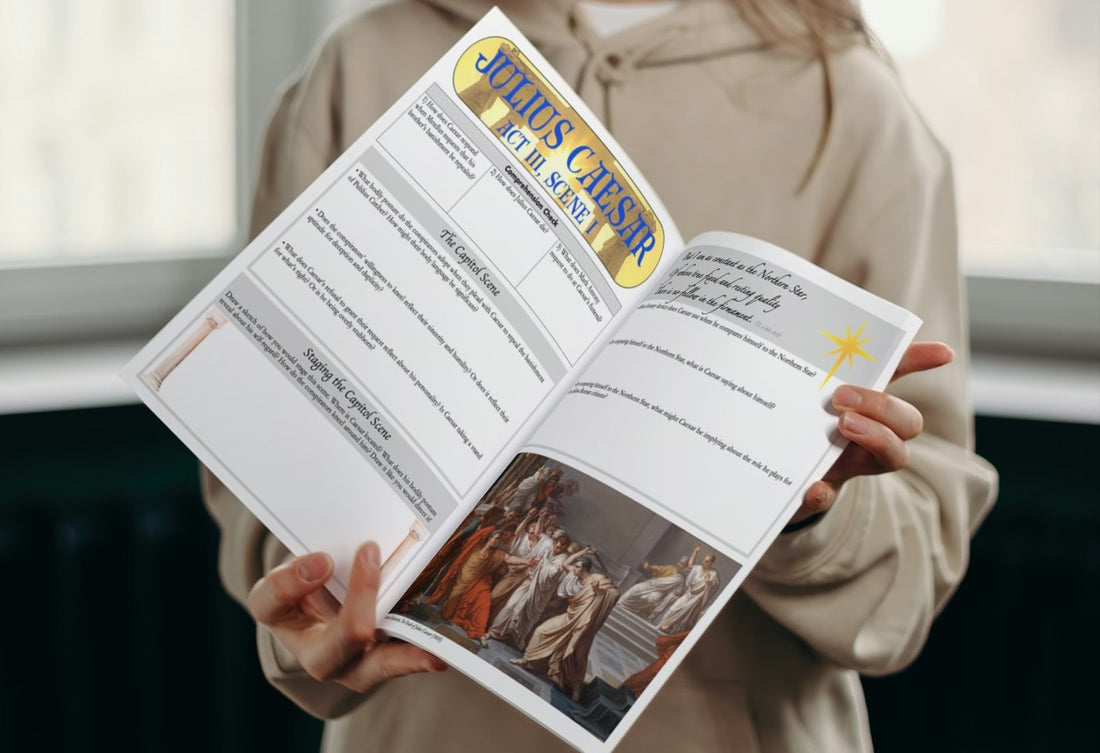
Eager to learn more about the historical context for William Shakespeare's play, Julius Caesar? The civilization of ancient Rome was founded as a monarchy that was governed by a series of kings who ruled for life. During this time, the common people had no political rights and were not given a voice in determining the laws. But the seventh Roman king, Lucius Tarquin, was overthrown in an uprising led by Lucius Junius Brutus, who abolished the monarchy and established the Roman Republic in 509 BCE.
The Roman Republic is widely considered to be one of the earliest examples of a representative democracy. When the Republic was founded, Rome became the first civilization to be governed by a group of elected Senators. These 300 Senators were entitled to wear a long white robe called a “toga.” The Senators proposed the legislative bills; and every citizen was able to vote on whether or not those bills should be passed. The bills which received a majority of votes would become laws.
If you’re a teacher who’d like to explore this topic with your students, then you’ll definitely want to check out this Complete Teaching Unit on Julius Caesar. Save yourself hundreds of hours of prep time while amplifying student engagement with this Complete Teaching Unit on Julius Caesar!
I. The Roman Republic: Free Speech & Rhetoric
In addition to introducing a political system grounded in popular representation, the Roman Republic developed a culture of free speech where people from different social classes could debate issues on equal terms. At the heart of the city was a public meeting place called the Roman Forum. The Forum was an open-air plaza where people could gather to deliver public speeches, hold free and open discourse, and debate the important issues of their day. This is why freedom of speech and assembly play such an important role within modern democracies like England and the U.S.
The citizens of ancient Rome developed a culture of oratory grounded in the use of rhetoric and rational persuasion. Literary scholar Andrew Hadfield explains why rhetoric became so important to the citizens of ancient Rome: “The central feature of the republic at its height was rhetoric, the public art of persuasion, enabling listeners to weigh up the evidence on either side of any argument and choose the right way forward” (Andrew Hadfield, “The End of the Republic: Titus Andronicus and Julius Caesar.” Shakespeare and Republicanism. Cambridge: Cambridge University Press, 2005. 171-172.)

II. Civil War
Yet roughly four centuries after it was founded, the Roman Republic began to falter when a conflict emerged between two Senators who had initially come to fame as generals by leading successful military campaigns: Julius Caesar and Pompey the Great. When these two long-time allies began to disagree over various legislative priorities, their disagreements escalated into a Roman civil war that lasted from 49 BCE to 45 BCE.
In 49 BCE, Julius Caesar led his army across the Rubicon river — the legal boundary which armies were not permitted to cross — and then conducted his soldiers into the city of Rome. Pompey was forced to flee from Rome and sought sanctuary in Egypt, where he eventually died.
But the supporters of Pompey raised a large army and took control of almost all the Roman colonies located in modern-day Spain. Led by Pompey’s two sons, Gnaeus and Sextus, they invaded and captured the city of Córdoba in 45 BCE. So Caesar led his army to Córdoba and subdued the uprising, killing Gnaeus and sending Sextus into hiding.
III. Shakespeare's Julius Caesar
William Shakespeare’s Julius Caesar opens with a scene that takes place right after Caesar has subdued the uprising by Pompey’s sons. The supporters of Caesar celebrate his triumphant return to Rome while the tribunes allied with Pompey scold those supporters for celebrating the fact that Caesar has killed fellow Romans.
After defeating Pompey, Julius Caesar wanted to increase his control over the government of Rome. He appointed himself as a dictator for life and gave himself a number of powers which diminished the authority of other governmental institutions. For example, he gave himself the power to veto the laws passed by the Senate. He also raised the membership of the Senate to 900 Senators, filling it with partisans who passed the laws which he supported. In sum, Julius Caesar began to act in ways that other Senators perceived as monarchical and authoritarian. Some Romans believed that Caesar’s real desire was to reinstate the monarchy and become the king of Rome.

So on March 15 of 44 BCE — which is known as the Ides of March — Julius Caesar was assassinated by a group of Senators who were led by Marcus Brutus and Gaius Cassius. These Senators viewed Caesar’s actions as a threat to the survival of democracy itself. They perceived themselves as fighting for freedom against tyranny, and they referred to themselves as the “Liberators.”
Indeed, when Marcus Brutus joined the conspiracy to assassinate Julius Caesar, he believed that he was following in the footsteps of his ancestor, Lucius Junius Brutus, who had overthrown the last Roman king and then founded the Roman Republic.
The assassination of Julius Caesar led to a civil war between Caesar’s allies and the Liberators. One side of the war was led by Caesar’s three most important associates: Mark Antony, Octavius Caesar, and Marcus Lepidus. The other side was led by Marcus Brutus and Gaius Cassius. The civil war came to an end with the Battle of Philippi in 42 BCE.
IV. Dramatic Irony
The civil war destroyed what was left of the Roman Republic. Thus, while Marcus Brutus and Gaius Cassius believed that the assassination of Julius Caesar would save democracy, their actions had the inadvertent effect of ending the Roman Republic. This is the tragic irony inherent in the historical events which are the focus of Shakespeare’s play, Julius Caesar. When Julius Caesar’s adopted son, Octavius Caesar, took power in 27 BCE, he became the first Roman Emperor.
It was at this time that the Roman Republic was replaced by the Roman Empire. A culture focused on the cultivation of community and friendship was replaced by a militarized culture committed to the conquest of foreign lands and peoples. Of course, the beauty of Shakespeare's play inheres less in what happens than in how the playwright dramatize the unfolding events. So nothing beats reading and analyzing the play itself....

Teach It Today!
If you’re a teacher who’d like to embark on a fascinating exploration of Shakespeare's play, then you’ll definitely want to check out this Complete Teaching Unit on Julius Caesar. The 160-page resource packet includes worksheets, discussion questions, and writing prompts for every scene in Julius Caesar. Best of all, it includes a teacher's answer key for every page!
Save yourself dozens of hours of prep time while motivating students to be highly engaged. Check out this Complete Teaching Unit on Julius Caesar. You'll use it for years to come!


2 comments
Great historical overview of the Roman Republic. This is exactly what I was looking for before teaching Shakespeare’s play. I appreciate that it’s included as a printable pre-reading handout in your amazing unit on Julius Caesar!
Your teaching unit on Julius Caesar was the perfect choice for AP Language and Composition. My students were more engaged than ever before with Shakespeare. I can’t thank you enough!